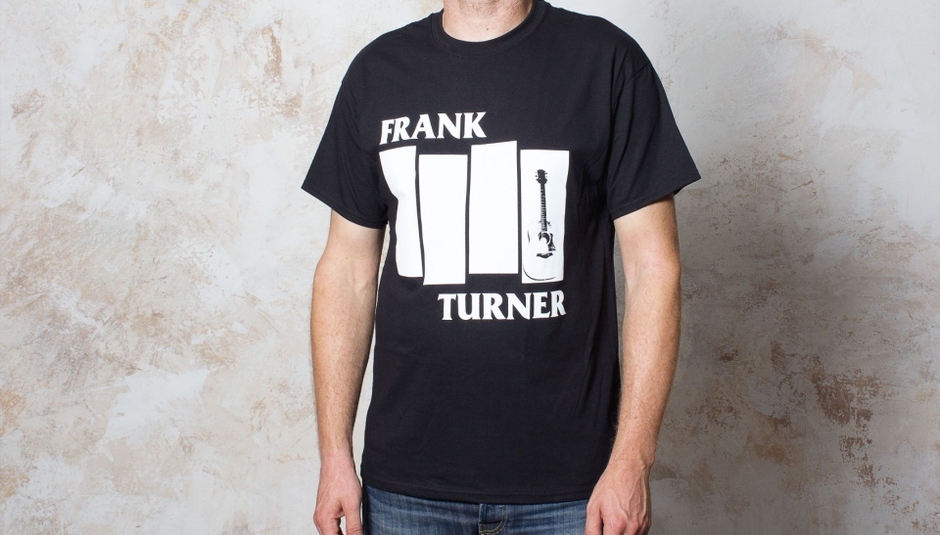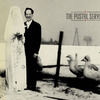Or “They wanted me to take my email address off my website, I said ‘Get Fucked’” - a conversation with Frank Turner.
Here’s a short story. When Frank Turner’s label sent me his new record, Tape Deck Heart in preparation for this interview, they sent it as an non-downloadable stream. This is usually fine but I didn’t have much time to sit in front of a computer before our chat and needed it on my iPhone, so I did something I rarely do - I checked to see if it had leaked and downloaded it illegally. Make of that what you will ethically, since I’d been sent it anyway and I wasn’t sharing, it squared with my moral compass just fine. What was interesting were the comments on the torrent site. “Frank is one of the few artists out there right now who really deserve the money.” said one user “I'll be downloading this, but I swear, the day before it comes out I'm deleting this and buying the record.”, another said “will be buying this on release but can't resist hearing it early- listen, enjoy and BUY!!!!”. There were many such comments. The passion and the dedication with which the average Frank Turner fan regards their hero is pretty much unequalled in modern music. It seems his one man mission to apply the ethics and integrity of the hardcore punk scene of his youth to chest-bursting everyman folk is paying off in spades.
The expansion of his fanbase to fill Wembley arena hasn’t dimmed that integrity, and a much-shared broadsheet article last year dredging up old political statements and painting him as a clueless, right wing posh boy hasn’t even dented his appeal. This week Tape Deck Heart entered the Top 40 at number 2, outselling new releases by Will.i.am (on prime time TV every Saturday, in the most successful pop act of the last decade), Phoenix (critical darlings) and Snoop Dogg (one of the biggest hip-hop acts of all time). Whatever Frank Turner is doing, it’s working. We joined him to discuss applying punk rock ethics to major label life.
I have to start with Thatcher - as the man who wrote ‘Thatcher Fucked The Kids’ what was your experience of the week of her death and funeral?
It’s been kind of a pain in the arse to be honest with you. I don’t believe in celebrating someone’s death, it’s a pretty basic social tenet for me, regardless of the politics behind it. I haven’t played that song since 2007 and I’ve had a few people saying this would be the perfect time to revive it. I don’t think it could be any less of an appropriate time to revive it, personally. I’m not a fan, but also i’m not interested in celebrating anyone's death. Since writing that song I’ve massively lost interest in involving politics in what I do, it’s way more hassle than it’s worth getting into constant shouting matches and taking abuse from people on the internet. I’ve got better things to do with my time.
Someone asked me to write “Maggie Maggie Maggie, Dead Dead Dead” on a piece of paper for them after a gig, and I just think “why on earth...?” I’ve got friends from outside the UK who can’t actually believe what some people have been doing in this country, having parties and celebrating. They’re saying “who does that?” and I said “I know”. I believe in free speech and if people want to have these parties or whatever, I’m not going to stop them - but I’m not going to be involved myself. It seems really tasteless to me.
Since we’re on politics, did the backlash from the Guardian article last year take you by surprise?
Yes it did. I need to phrase this carefully...as a piece it was an attempt at a character assassination, and quite a successful one because I received a shit tonne of hate mail and death threats and all the rest of it. People were calling me a cunt seven ways til Tuesday because I happened to disagree with them, and it’s no fun. I can sit here and say I don’t give a shit, but it’s no fun at all to be on the receiving end of that kind of shit. It particularly annoyed me because first of all I’m not an activist and I’m not trying to get people to agree with me, and secondly because the entire centrality of my view of politics is that I’m anti-authoritarian. I don’t think anyone has the right to order anyone else around. People were calling me a cunt because my dearest burning desire was to leave them alone and not have any dominion over their lives. It put me off any public discussion of politics, I just don’t care enough.
I’m not going to be Stalinist about things though. The guy who published the original interview that the Guardian was quoting from offered to take it down, but I did say those things and think those things as a certain point in my life. It was vicious essentially. The tone of the whole thing was pretty vicious. It was not fun.
---
---
Is it even possible to separate politics and music?
I think it’s entirely up to individual artists and how they want to handle it. For me personally, I was kind of thinking along those lines before all of this kicked off. One thing that music can do is bring people together and be a uniting force. It’s a beautiful thing when you have a room full of people from all different walks of life who put aside their differences and leave their baggage at the door. For a moment you create something that’s greater than the sum of its parts. I know that sounds like a hippy-dippy thing to say, but that moment where you get a whole room full of people singing together is a magical moment. That’s the effect I’m interested in creating with what I do musically and if you throw politics into the middle of it, people disagree about stuff. And I know there are people who find that to be a remarkable statement, but people do disagree about politics. That’s the whole fucking point. If you do throw that into the middle of it you break the spell and suddenly everybody’s at loggerheads. There are lots of people and bands for whom politics is a central part of what they do - the extreme and obvious example is Billy Bragg - and good for him. I respect that, I respect the tenacity in making that the centrality of what he does. It’s just not what I’m trying to achieve, it’s not what I’m interested in doing.
You do tend to build sing-a-longs into your stuff - is that an essential part of creating that ‘moment’?
I slightly hesitate there. There’s a something deep inside me that hesitates to say I write to have a singalong, although in fairness Ian MacKaye from Fugazi says he does that, so if he does it anybody’s allowed to. It’s interesting to me, that moment when the barriers between performers and audience breaks down and it becomes a more communal, collective activity. I’m not saying that it isn’t that it feels really good or it makes a good show, it’s just more creative and artistically interesting to me as well.
Moving onto the album, all your records feel personal, but this one feels uniquely so. Would you say that’s true?
Yes, I think that’s true. There’s a number of reasons for that. Partly because events in my personal life have given me things to get off my chest. Also I think that England Keep My Bones, my previous record, thematically tended towards the grandiose. It was about England and it was about death and national identity and whatever you want to say, and that’s fine, but after a certain point a lot of bands, after they get a reasonable degree of success don’t say anything personal at all, they become completely guarded and defensive because they’re worried about who’s listening and what they’re saying, and it becomes really bland, it becomes less interesting and I’m at pains not to do that. I think on that level there was an attempt to look inwards rather than outwards for this record.
Do you tend to go into albums with a lyrical and musical agenda? Your most recent two especially have had very strong identities?
I do my level best never to do that actually. I think it’s really important that the creative moments when you’re writing are sacrosanct, that they exist outside of any of those considerations. Because I write autobiographically and chronologically, themes do arise because of the continuity of what’s going on in my life, but it’s not written towards that.
As well as the the more personal, inward looking side to the record there’s very much a romanticisation of punk rock and the hardcore scene running parallel to that, very much that kind of Get in the Van ethic [that’s Henry Rollins’ Black Flag tour diaries, a must-read handbook for the ethics of DIY and hardcore- MB] that seems to shy away from the sleeping-on-floors-and-being-sick-in-your-sleeping-bag side of DIY bands. Do you think you do romanticise that? Was it done intentionally?
Again I’d hesitate to say it was calculated or anything, but it is something that I feel quite romantically about. Certainly on the song ‘Four Simple Words’ on the record. As I’ve got older it’s interesting to me that punk rock is as significant to me on a personal level as it was when I was 16. It does mean slightly different things to me now. When I was 16 I thought punk was going to change the world and if only everyone would listen to Minor Threat there would be eternal international peace or whatever, but to me these days it’s about a tribe, it’s about community. It’s also about the ability to create a space in which you can organise the world in a way that makes sense to you. It’s not necessarily about changing the entire world to agree with you and how you see the world, but it might be about fencing off a small area in which you can live among the guidelines and principles that you think are right. On that level I think 'tribal' is the right word. I feel very tribal about punk rock, and on those occasions where I’m at Fest in Florida or Punk Rock Bowling, or one of those great comings-together I feel as at home as I do anywhere.
---
---
Do you see a link between the DIY ethos of the Frank Turner of Million Dead and Kneejerk, who made the Paper Cuts fanzine, and the Frank Turner of Wembley arena and the Olympic Stadium?
You know about that [the fanzine]? Oh man.
I’ve done my research! Is there a germ of that DIY ethos still there?
Very much so. At least I think there is, though there’s lots of people who disagree with me on that. I think for me one of the things about DIY as a concept, which is one I’m very attached too, is that people take it to mean that it has to be badly photocopied and handed out at shows. That’s not quite how I take it - to me the idea of DIY is the idea of not waiting around for somebody else to do something for you. Sure, when you start out as a band, book your own shows and put out your own records, but if you reach the point where you’ve got someone who can do that for you then fantastic. Do that and it frees up your time to do other things. So it’s about being proactive. There’s a degree of iconoclasm to it to, the idea that you don’t hold yourself above the audience, and I don’t really. I do my best, my email address is public domain, I hang out after shows and say hi to people, whatever I can do. It’s not limos and sunglasses and minders and all that sort of shit and it never will be. So the idea of that punk rock DIY ethos is very central to how I approach my business and my music. I know there’s people who balk at that suggestion because they can’t make the connection between those statements and headlining somewhere like Wembley or whatever, and fair enough, each to their own opinion. That’s certainly how I approach things in my life.
Do you find that hard to maintain? The thing about hardcore gigs is that you really do feel there’s no disconnect between the audience and the band on stage, and that the next band could just step out of the front row and pick up their instruments - there’s a gang mentality between everyone. Surely the bigger you are the harder it gets to do that? Coming from your background is that something you find challenging?
It is challenging, I think the way you put it is exactly right. I remember my first hardcore show, it was at the Garage and it really was a case of the next band just jumping over the barrier and setting up their equipment. It blew my mind because prior to that I’d only ever seen Foo Fighters at Reading Festival or whatever, massive big bands. That simple gesture of the people on the stage then coming into the audience or out of the audience or whatever was mind blowing to me and it was one of the defining philosophical events of my life. Growing up with punk rock and with hardcore gives you that sense, and I think it’s a real important, strong one. I try really hard to keep that in what I do. Having said that, of course it gets difficult. One of the reasons it does - and I need to phrase this in a way where I’m not having a go at anyone - sometimes people react to me in a way that I find slightly weird, they’ll start going “oh my god!” and start jumping up and down. It’s not my business to tell anybody how to react to me, but it’s sort of disruptive now. Put it this way, up until a few years ago I used to make a point of going out and watching my support bands from the crowd, but I can’t do that now because it becomes a massive furore, and also it distracts the people from watching the band, which is what I’m trying to do - it’s why I brought them out on tour. There’s a balance to be struck and it’s not always easy to get right, but as a guiding principle it’s something I want to maintain.
On a similar note, this is your first record you’ve released through the major label system, though I know Polydor weren’t involved during the making of the record, but the release has been through their system. Has that changed the way you approach the promotion and the stuff that surrounds putting a record out?
No, I haven’t aside from the fact there’s just a lot more of it to do. The workload has increased significantly. Just to talk you through the details; I re-signed with [independent label] Xtra Mile and then we talked about doing a licensing deal to people in the Universal group, which we did, but it was nice because we were able to approach them and say “these are the things that we want out of this, and if you’re not going to give them to us then we don’t need to do the deal” because we could carry on how we had been. Little examples like making sure those small punk rock blogs who’ve been covering my stuff and doing interviews with me from day one continue to be included. There was a suggestion that I take my email address of my website and I was like “get fucked”. That was the end of that idea. So my press schedules vastly increased in volume, but I don’t think it’s changed the character of what I do. It’s just the music’s coming out to more people, and that’s fine. It’s not changed how I approach what I do, although again there are people will disagree with that.
A final point: can you name five hardcore bands and five protest singers that people who haven’t experienced those genres should be checking out as an entry point?
Okay, let’s do this. Hardcore, let’s say... Black Flag, Minor Threat, Sick of it All, Refused, post - The Shape of Punk To Come obviously rather than the terrible, terrible stuff they did before. Let’s say Converge as well. I’m not entirely sure whether they count as a hardcore band any more, I feel like they’ve transcended that, but whatever, they’re still fucking brilliant. And protest singers, well you kind have to say Bob Dylan and you kind of hard to say Billy Bragg as well, so let’s start with those two, then Phil Ochs, David Rovics, do you know him? He’s Canadian I think, he’s a fantastic and Chris TT as well, he’s a sweetheart.
Tape Deck Heart is out now
---






















